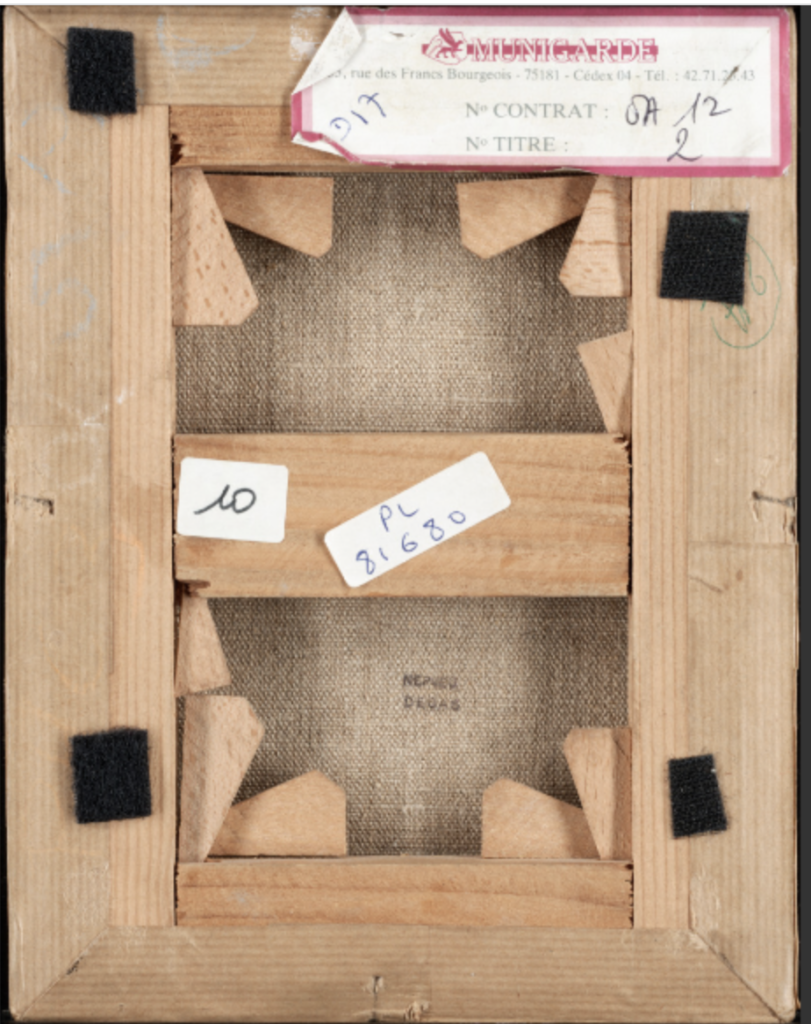October 29th, 2021 by dave dorsey

This is the verso view of the Degas self-portrait at the Getty. I was surprised at how many stretcher bar “keys” were wedged into every available joint in the wood to tighten it up. I generally use them as a last resort, keeping the surface flat by using different kinds of linen canvas for larger paintings than for small, unfastening the canvas and restretching, and so on. The problem I’ve had with this method is that the wedges loosen up in transport so that a tightly stretched canvas comes out of the crate a little slack by the time it arrives at a show. Also surprised that such a relatively small painting would need this much attention: smaller linen canvases tend not to loosen up in a visible way in my experience. It’s a pleasant surprise to see how a 160-year old painting looks almost brand new from the back: maybe because some comparatively recent attention was given to restretching it on new wood. It would be interesting to see how someone would do this job in such tight spaces behind the canvas.
October 23rd, 2021 by dave dorsey

Rod Penner, 290 East Brenham TX, acrylic on canvas, 32″ x 48″, detail
1
There’s a sense in which Vermeer’s interiors have an aura similar to that of a religious icon. There is little that’s explicitly religious in Vermeer’s subject: civilized, upper-middle class life in a culture where capitalist wealth was generating a new quality of life and an economic environment where painting could thrive. You can look at other work during the same period and be astonished at the quality, but in Vermeer, something unique emerged, this ability to convey the most ordinary moments in a tranquil, prosperous household as if they were eternal, blessed, somehow transfigured by ordinary sunlight through a leaded glass window. In a certain sense, Vermeer used purely esthetic means to awaken an ethical sense in the viewer—ethical in Ludwig Wittgenstein’s broad and slightly unconventional sense of the word. He opens his lecture on ethics with a startling assertion: “Now I am going to use the term Ethics in a slightly wider sense, in a sense in fact which includes what I believe to be the most essential part of what is generally called Aesthetics.”
He goes on to explicate what he’s attempting to say:
Now instead of saying “Ethics is the enquiry into what is good” I could have said Ethics is the enquiry into what is valuable, or, into what is really important, or I could have said Ethics is the enquiry into the meaning of life, or into what makes life worth living, or into the right way of living. I believe if you look at all these phrases you will get a rough idea as to what it is that Ethics is concerned with.
If you have read enough Wittgenstein, you would recognize that he is saying things that he, in other contexts, would call nonsense. This is not a pejorative term for him. It’s fundamental nonsense. To enquire into the “meaning of life” is to do something of almost grave importance, something he highly respected—as a threshold for living properly. (He would undoubtedly go on at length about the various implications of saying “properly” here.) This was, more or less, the mission of Socrates, to use reason as a ladder at the top of which you step off to live a good life, in the ethical (and also esthetic) sense of the word. It’s not a coincidence that Wittgenstein was the most Socratic of all Western philosophers since Socrates. He taught and philosophized by thinking along with his students, and he published only one book—which actually ought to draw comparisons to the pre-Socratics in its epigrammatic form—in his lifetime. What good means in this context is essentially indeterminate, inexpressible, but that doesn’t mean that it’s relative or subjective. Wittgenstein understood that to assert “I need to know the meaning of life” is to say something accurate and meaningful about a pursuit of nonsense—in his usage of that term. You are saying something about yourself that can be verified in a sense, so that the sentence itself has reasonable content about you, but the phrase “meaning of life” isn’t a signifier for which there are corresponding facts in the world. If the world is “everything that is the case” or the sum total of all facts, and logical thought consists only of propositions about the world that can be either true or false, then a phrase for which there are no corresponding facts is not logical; it is nonsense. And yet the fact that the phrase exists, that people use it, shows something that the words themselves cannot say: it “shows forth” the universal human urge to say what isn’t sayable, to think what can’t be thought—to discover, as it were, what life is. To put it another way, it demonstrates the human desire to step outside the world and see the whole of it clearly, objectively, in a way that makes sense of the totality of being. This is rationally impossible for a thinking individual, living within the world. You can’t step outside yourself and get a good look, let alone step outside the entire world for a more comprehensive view. In a similar way, in Tractatus Logico-Philosophicus, Wittgenstein pointed out, in reference to logical thought as a picture of the world, “2.174 A picture cannot place itself outside its form of representation.” And “3 The logical picture of the facts is thought.” Therefore, thought cannot get outside itself to see and express clearly its own relation to the world. Nevertheless, thought reaches its limit and keeps pushing, speaking nonsense—in Wittgenstein’s sense—in order to express what’s unthinkable and inexpressible. There is something both absurd and yet utterly essential in this endeavor, this craving, and this restless compulsion resides at the core of Wittgenstein’s life work. He spent his life attempting to clarify the limits of reasoning and to show how reasoning—and especially science—isn’t enough, it can only take you so far, and not very far at that, when it comes to understanding how to live a good life, in both the ethical and aesthetic sense.
In his essay on ethics, he says:
I contemplate what Ethics really would have to be if there were . . . a science, this result seems to me quite obvious. It seems to me obvious that nothing we could ever think or say should be the thing. That we cannot write a scientific book, the subject matter of which could be intrinsically sublime and above all other subject matters. I can only describe my feeling by the metaphor, that, if a man could write a book on Ethics which really was a book on Ethics, this book would, with an explosion, destroy all the other books in the world. Our words used as we use them in science, are vessels capable only of containing and conveying meaning and sense, natural meaning and sense. Ethics, if it is anything, is supernatural and our words will only express facts; as a teacup will only hold a teacup full of water . . . <even> if I were to pour out a gallon over it.
One’s first reaction to this is to say that there are, on the contrary, many quite obvious ways to describe ethical behavior, good behavior, a good life. Why is a book on ethics so unthinkable? Karen Armstrong, who studies the commonalities of the world’s religions, reduces the essence of religion to one imperative, The Golden Rule. This would seem to be a way in which one could answer the question about the most important thing in life, or the meaning of life: to not do to others what you wouldn’t want them to do to you. This is for her the heart of all ethical codes. But this advice isn’t a proposition that can be verified; it isn’t a statement of fact that is either accurate or inaccurate. It isn’t an argument that turns a command—love your neighbor as you love yourself—into a propositional truth. It’s still an imperative, or command, and is in a sense supra-natural, not a proposition about facts, not something derived from the world or the sum total of facts about the world. It isn’t something one can derive rationally from what is the case in the world. The goodness of treating others with kindness and love may seem self-evident, but only if you begin with a presupposition of a self-evident absolute good—and reason has no way to express or comprehend this absolute other than to believe that it obtains. It doesn’t exist in the world and reason can only contend with facts in the world. This presupposition of an absolute good may be utterly central to your life, but as a rational postulate it’s a chimera. Absolute goodness can’t be located or described or, really, imagined, let alone verified. For Wittgenstein, the only way to clarify this idea of The Good is to observe how language about it is used in a particular way of life.
All of this carries over into how Karen Armstrong, in A Case for God, explains why religion has become intellectually discredited over the past two centuries and yet is alive and well, in various forms across the globe: because it has been misunderstood as a set of propositions about the world rather than a complex language that “shows forth” a way of life that can embody a distinctly different awareness of human existence, with all the concomitant behavior that embodies it. The key for her, and Wittgenstein—and Tolstoy before him—was the realization that religion (and art for that matter) are ways of life, founded on the desire to align oneself with absolutes that transcend the facts of the world. Only with an assumption of these absolutes do facts have any value whatsoever. Otherwise, the world is a collection of neutral facts, none of which have more value than the others. Wittgenstein says:
I see now that these nonsensical expressions were not nonsensical because I had not yet found the correct expressions, but that their nonsensicality was their very essence. For all I wanted to do with them was just to go beyond the world and that is to say beyond significant language. My whole tendency and, I believe, the tendency of all men who ever tried to write or talk Ethics or Religion was to run against the boundaries of language.
This running against the walls of our cage is perfectly, absolutely hopeless. Ethics so far as it springs from the desire to say something about the ultimate meaning of life, the absolute good, the absolutely valuable, can be no science. What it says does not add to our knowledge in any sense. But it is a document of a tendency in the human mind which I personally cannot help respecting deeply and I would not for my life ridicule it.
2
In this essay on ethics, as should be obvious from the clarity of these quotes, Wittgenstein says fundamental things about both ethics and aesthetics, religion and art, directly and plainly (in a way that’s more conversational than his better-known work which often leads the reader around the insight he wants to evoke, circling it and aiming at it obliquely.) For example, about his intimations of absolute goodness:
I believe the best way of describing it is to say that when I have it, I wonder at the existence of the world. And I am then inclined to use such phrases as ‘how extraordinary that anything should exist’ or ‘how extraordinary that the world should exist.’
And shortly, he adds:
The first thing I have to say is, that the verbal expression which we give to these experiences is nonsense! But it is nonsense to say that I wonder at the existence of the world, because I cannot imagine it not existing.
MORE

